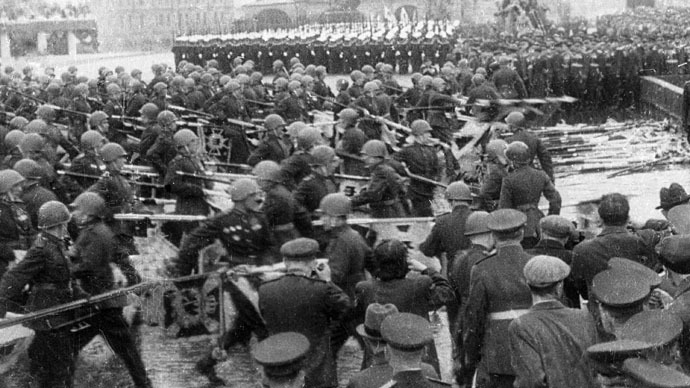‘Heroism & sacrifice: Impossible to put in words enormous Soviet losses in WWII’

Statistics tell their own story: during the Battle of Stalingrad the Red Army lost more soldiers than the British and the Americans throughout the whole of WWII, Second World War historian Professor Geoffrey Roberts told RT’s In the Now show.
RT:Can we separate the Great Patriotic War from WWII. Can it stand alone as we look back at history?
Geoffrey Roberts: No, I don’t think we can separate the Great Patriotic War from WWII. The Great Patriotic War was an integral part of WWII. In fact, the Great Patriotic War was the most important part of the WWII. The victory over fascism and Nazism in 1945 was a common victory and that is what needs to be celebrated on the 70th anniversary. Of course the most important part of the war was the Great Patriotic War. The Soviet Union contributed more to the victory over Hitler than any other country, but the Soviet Union and Russia didn’t win the war on its own - it won the war as part of the great alliance against Hitler and the Nazis.
RT:Is, do you think, the sacrifice the Soviet people made, the Soviet Union as a nation, acknowledged around the world and by those that it fought with throughout the war.
GR: I think there is quite a lot of recognition on the part of people who are interested in history and are interested in WWII. At the present time that recognition is rather begrudging recognition because of the political context of the Ukrainian crisis. I think this anniversary has represented an opportunity to bring the history of the world to the fore, in particular to the Soviet contribution to the world.
RT:How does one put into words the losses suffered by Russia and the Soviet Union? Is it possible?
GR: No, it is impossible, the losses were so enormous, so devastating. Also it is not just a question of loss or sacrifice; it is also a question of heroism. It is difficult to cross the heroism that was part of the story of the war itself. One way of trying to get a handle on the sacrifices is through some statistics ... For example, during the battle for Stalingrad the Red Army lost more soldiers than the British and the Americans throughout the whole of the WWII. And million Soviet soldiers died liberating Ukraine from Nazism; another million Soviet soldiers died liberating Poland from the Nazis. To me those statistics tell their own story. Again one has to bear in mind that the losses, the tragedy would have been all that much greater had not the Soviet Union fought that war alongside important allies such as Britain and the US.
MORE:
The statements, views and opinions expressed in this column are solely those of the author and do not necessarily represent those of RT.
The statements, views and opinions expressed in this column are solely those of the author and do not necessarily represent those of RT.












